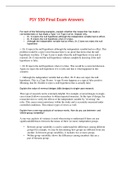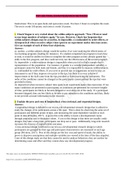PSY 550 (PSY550)
Grand Canyon University
Page 4 out of 64 results
Sort by
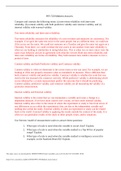
-
PSY 550 Midterm - Questions & Answers, Latest 2022 Complete 100% Correct Answers, Grand Canyon University.
- Exam (elaborations) • 5 pages • 2022
-
- $17.29
- + learn more
PSY 550 Midterm Answers Compare and contrast the following terms: (a) test-retest reliability with inter-rater reliability, (b) content validity with both predictive validity and construct validity, and (c) internal validity with external validity. Test-retest reliability and Inter-rater reliability: Test-retest reliability measures the reliability of a test overtime and measures its consistency. For example, if we gave the same test twice to the same people, but at a different time, we co...
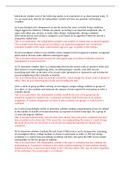
-
Grand Canyon University:PSY 520 Topic 1 Exercise 1, Chapter 1 to 4;Verified Answers(Graded A)
- Exam (elaborations) • 12 pages • 2022
-
Available in package deal
-
- $9.49
- + learn more
1.8 Indicate whether each of the following studies is an experiment or an observational study. If it is an experiment, identify the independent variable and note any possible confounding variables. (a) A psychologist uses chimpanzees to test the notion that more crowded living conditions trigger aggressive behavior. Chimps are placed, according to an impartial assignment rule, in cages with either one, several, or many other chimps. Subsequently, during a standard observation period, each ...
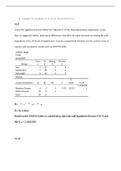
-
Grand Canyon University_PSY 520 Topic 6 Exercise:Chapter 16, 17, 18 COMPLETE SOLUTION
- Exam (elaborations) • 15 pages • 2022
-
Available in package deal
-
- $13.49
- + learn more
Chapter 16, numbers 16.9, 16.10, 16.12 and 16.14 16.9 Given the aggression scores below for Outcome A of the sleep deprivation experiment, verify that, as suggested earlier, these mean differences shouldn’t be taken seriously by testing the null hypothesis at the .05 level of significance. Use the computation formulas for the various sums of squares and summarize results with an ANOVA table. ANOVA: Single Factor SUMMARY Groups Coun t Su m Averag e Varianc e zero 3 15 5 4 twe...
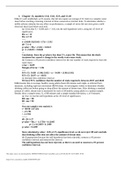
-
Grand Canyon University_PSY 520 Topic 5 Exercise:Chapter 13, 14 and 15 COMPLETE SOLUTION(A Plus Work)
- Exam (elaborations) • 7 pages • 2022
-
Available in package deal
-
- $10.49
- + learn more
13.6 It’s well established, we’ll assume, that lab rats require an average of 32 trials in a complex water maze before reaching a learning criterion of three consecutive errorless trials. To determine whether a mildly adverse stimulus has any effect on performance, a sample of seven lab rats were given a mild electrical shock just before each trial. 13.8 Assume that on average, healthy young adults dream 90 minutes each night, as inferred from a number of measures, including rapid eye moveme...
PSY 550 Final Exam Answers
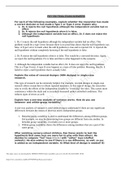
-
PSY 550 FINAL EXAM ANSWERS
- Exam (elaborations) • 4 pages • 2022
-
- $7.49
- + learn more
For each of the following examples, explain whether the researcher has made a correct decision or has made a Type 1 or Type 2 error. Explain why. 1. Dr. G rejects the null hypothesis although the independent variable had no effect. 2. Dr. R rejects the null hypothesis when it is false. 3. Although the independent variable had an effect, Dr. E does not reject the null hypothesis 1. Dr. G rejects the null hypothesis although the independent variable had no effect. This problem would be a t...
PSY 550 Final Exam set (Two sets) (Latest 2020)/PSY 550 Final Exam set (Two sets) (Latest 2020)/PSY 550 Final Exam set (Two sets) (Latest 2020)
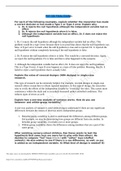
-
PSY 550 Final Exam Answers; Grand Canyon University
- Exam (elaborations) • 4 pages • 2021
- Available in package deal
-
- $10.49
- + learn more
PSY 550 Final Exam Answers; Grand Canyon University/PSY 550 Final Exam Answers; Grand Canyon University For each of the following examples, explain whether the researcher has made a correct decision or has made a Type 1 or Type 2 error. Explain why. (a) G rejects the null hypothesis although the independent variable had no effect. (b) R rejects the null hypothesis when it is false. (c) Although the independent variable had an effect, Dr. E does not reject the null hypothesis. Explain the value o...
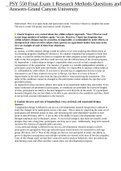
-
PSY 550 Final Exam 1 Research Methods-Questions and Answers-Grand Canyon University
- Exam (elaborations) • 5 pages • 2021
-
- $6.49
- + learn more
1. Chuck Wagon is very excited about the within-subjects approach. “Now I’ll never need to run large numbers of subjects again,” he says. However, Chuck has forgotten that within-subjects designs may be a) useless, b) impossible, c) confounded by order effects, or d) impractical when excessive subject time spent in an experiment makes data inaccurate. Give an example of each of these four objections. Answer: a). useless- a within-subjects design would be useless if we were studying t...
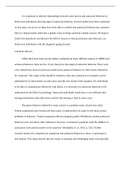
-
PSY 550 - Research Proposal.
- Exam (elaborations) • 12 pages • 2021
-
- $15.49
- + learn more
PSY 550 - Research Proposal. / PSY 550 - Research Proposal. It is important to identify relationships between some factors and antisocial behaviors to better treat individuals showing signs of antisocial behavior. Several studies have been conducted on this topic, yet no two of them have been able to confirm that antisocial behavior has a positive link to it being learned rather that a genetic issue or being caused by outside sources.

That summary you just bought made someone very happy. Also get paid weekly? Sell your study resources on Stuvia! Discover all about earning on Stuvia

